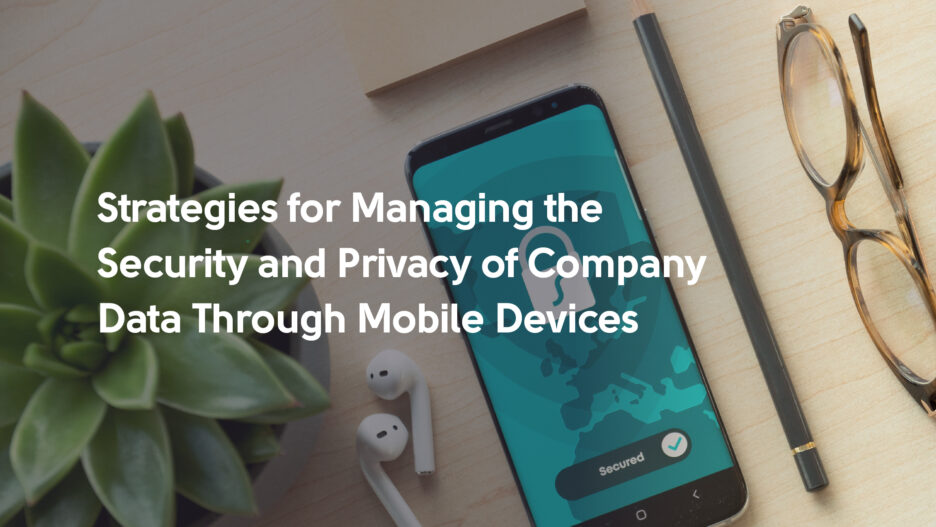In 2021, 82% of surveyed companies in the US would have the Bring Your Own Device (BYOD) policy in the workplace. This policy has proven its efficiency as it enabled employees to improve their productivity and mobility, while employers were able to save costs on pricey hardware and its maintenance. However, data security and malicious software concerns are still a huge concern for employers.
For instance, mobile devices and applications have become an integral part of our lives, storing crucial information such as medical records, bank accounts, contact details of family and friends, and cherished photos. As our mobile devices store a treasure trove of personal information, the need for mobile device security has never been more vital.
Cybercriminals recognize the allure of targeting mobile devices, as the potential rewards outweigh the risks. Whether their motives involve acquiring personal information or financial gains, the consequences of a data leak can be devastating, including identity theft and financial loss. Consequently, mobile device security has emerged as a paramount concern for individuals and businesses.
Though operating system security protects device access, devices can still be vulnerable. As such, a second line of defense must be implemented to ensure the device's integrity at the application level. Since employees can access business data through mobile devices, a single breach could expose confidential information like financial records, client data, and intellectual property. This not only costs the company a lot of money, but it also hurts its PR image.
Mobile data protection is very important for app users to keep their personal information safe. Users must trust that their private information, such as credit card numbers or medical records, is safe when mobile apps can access it.
This article will cover the top tips, practices, and best strategies to enforce robust security protocols for data access through mobile devices. This topic will continue to be relevant for years as more and more people access information via mobile devices, whether for work or personal use.
Importance of Security and Privacy for Mobile Devices
Data safety is one of the most crucial aspects of mobile device security. Whether data is kept on the device or in the cloud, it's important to make sure it's encrypted and safe from unauthorized access. For instance, encryption ensures that even if someone gets their hands on the device or data, they can't read it or use it without the right key.
Access control is another important part of protecting mobile devices. It should only be given to people who are allowed to use it, and there should be ways to make sure that only those people can have access to sensitive info. Passwords, biometric security, or two-factor authentication can all be used to do this.
Let’s imagine a healthcare provider who allows medical staff to access sensitive data from mobile devices. If one of those devices is lost or stolen, it's imperative to make sure that no one can get to the device or the information on it. This can be done by turning on remote wiping, which lets all the data on the device be erased from afar. This ensures that private data can't be seen even if the device ends up in the wrong hands.
In parallel, privacy is an important part of keeping a mobile device safe. Users should be able to decide what information is taken, how it is used, and who can see it. Ideally, software development companies should set up privacy policies that make it clear what information is being gathered and how it will be used. Users should also be able to choose not to have their information collected and should be able to delete their information if they want to. Some of these requirements are mandatory to develop applications for mobile platforms.
Potential Risks of Using Mobile Devices to Access Critical Information
Mobile devices are susceptible to phishing, malware, and spyware, to name a few. Upon successful infiltration, cyber attackers can exfiltrate sensitive data, deploy malware, and potentially establish remote access to the compromised device.
One of the potential hazards of using mobile devices when accessing sensitive data is the susceptibility to data interception while connected to public Wi-Fi networks. Cyber attackers can easily establish fraudulent wireless access points or eavesdrop on authentic networks and exfiltrate confidential information, including login credentials, financial data, and payment card details.
Let's say a business executive is traveling to a conference and needs to access a confidential business document on their mobile device. While waiting at the airport, the executive connects to a free Wi-Fi hotspot to access the document. However, this Wi-Fi hotspot is a fake one set up by a hacker. The hacker can intercept the traffic and steal the executive's login credentials. The hacker now has access to the confidential business document and can use it for malicious purposes, such as selling it to a competitor or using it for ransomware attacks. This example illustrates how even a simple act of connecting to a free Wi-Fi hotspot can lead to significant risks for businesses and individuals.
Implementing measures to mitigate the potential threat of device theft, fortifying against malicious actors and cyber threats, and exercising prudence when accessing unsecured public Wi-Fi networks are all imperative actions in safeguarding sensitive data.
Another risk of using mobile devices to access critical information is that because mobile devices are small and portable, they are easy to lose or steal. If a device with important information gets into the wrong hands, private data could be accessed without permission and used in a bad way.
Let’s say an employee leaves their phone unattended at a coffee shop, and it gets stolen. The stolen device has login information and access to a company's financial tools, which could lead to fraud and make it harder for the business to run.
Another threat is malware and phishing attacks, in which malicious software or fake websites try to trick users into giving private information, can happen on mobile devices. This can let people get into important systems without permission or put malicious software on the device.
If mobile devices are not properly encrypted, unauthorized people can get to the data saved on them if the device is lost, stolen, or hacked. Encryption helps keep important information private by making it impossible for unwanted users to read.
Let’s say that, during a work trip, an employee of a company loses their tablet. Since the device wasn't encrypted, anyone who finds it can access the private client data on it. This could lead to a breach of client trust and privacy.
Employees or other people who are allowed to access important information could use their mobile devices to steal or leak private information. This can happen on purpose or by chance, putting the security and privacy of important business information at risk.
Imagine that a disgruntled worker takes screenshots of confidential project plans with their phone and sends them to a rival. This insider threat can hurt the company's ability to compete and can reveal secret business plans.
11 Strategies to Manage Mobile Device Access to Company Data
Given the proliferation of mobile devices in corporate environments, it is imperative to establish optimal protocols to safeguard organizational data. Below are some optimal techniques for regulating mobile device access to corporate data:
1. Implement Mobile Device Management Policies
A Mobile Device Management (MDM) solution can effectively manage and secure mobile devices used in corporate settings. MDM solutions are capable of enforcing robust security policies, regulating access to sensitive company data, and facilitating remote wiping of devices in the event of loss or theft.
An example of an MDM solution is Microsoft Intune. Microsoft Intune allows businesses to manage and secure mobile devices used in the workplace. It can enforce security policies, control access to company data, and remotely wipe devices in case of loss or theft.
2. Select What Data Needs to be Stored on a Device
Discerning which data should be retained on a mobile device and the data that requires access solely through a secure VPN connection can help minimize the potential for breaches in the event of device loss or theft. For example, an employee might be required to access data through a secure VPN connection rather than storing the data on their mobile device.
3. Implement Screenshot/Recording Protection/Warnings
To enhance security, it is recommended to implement a protection mechanism or warning message when a user attempts to take a screenshot or record the screen of the device. This feature proves to be valuable in scenarios where confidential data is exhibited on the display, for instance, private conversations or financial details. This can be seen in some chat apps that warn users when another user takes a screenshot of their private chat.
4. Prevent Pasting Text Data in Text Fields
To enhance security measures, it is recommended to enforce a policy that prohibits users from pasting text data into text fields. Implementing restrictions on copy-and-paste functions can serve as a preventive measure against potential attackers attempting to exfiltrate sensitive data.
An example of preventing pasting text data in text fields is implementing a policy that requires users to manually enter information rather than copy and paste it. This can be seen in many banking apps that use data paste protection, which allows users to paste text only after specific user permission.
5. Encrypt Critical Data on Mobile Devices
Data encryption can help safeguard critical information. As stated earlier, it is highly recommended that developers implement encryption of persisted data to protect sensitive information from unauthorized access in mobile devices.
6. Encrypt Your Protocol for Transferring Data
Implement encryption for the data transfer protocol to enhance security. Utilizing secure communication channels such as VPNs and HTTPS can ensure that all network data transmission is encrypted and secured. VPNs create a private connection between a mobile device and a company network, building secure communication.
7. Improve Mobile User Authentication Policy
Companies should enhance the mobile user authentication policy by mandating the employment of robust passwords, multi-factor authentication, and other protocols for accessing corporate data on mobile devices. This enhances the security measures to prevent unauthorized access to sensitive data on the device.
8. Use Biometric Authentication
Implementing biometric authentication as a security measure adds an extra layer of protection. This may involve biometric identification methods such as fingerprint scanning, facial recognition, or other similar techniques available on the device.
9. Blur App Content on App Switch
Blurring or concealing confidential information upon a user's transition to a different application can help mitigate the risk of unauthorized access to sensitive data in case of unattended devices. This can be seen in many banking apps that blur the content in order to prevent unauthorized access.
10. Enforce Mobile Application Updates
Mandate updates for mobile apps to guarantee that the software incorporates the most recent security features and addresses any potential vulnerabilities present in previous versions. Patches can be done manually or automatically using a patch management tool like Microsoft Endpoint Manager or by enabling automatic updates for applications in system preferences.
11. Use Tokens for Financial Transactions
One crucial strategy for managing the privacy and security of company data accessed through mobile devices is to avoid storing credit card numbers openly. Storing such sensitive information in plain text increases the risk of unauthorized access and potential data breaches. Instead, organizations should adopt best practices and utilize services that provide tokens for transactions. Tokens act as placeholders for credit card numbers, ensuring that the actual payment information is securely stored by trusted third-party providers.
Wrapping Up
Mobile devices are indispensable to our daily routines. During and after the pandemic, working from home became the norm for many enterprises, leading to droves of employees using personal mobile devices to access company data.
Inadvertently, this has led to a serious headache for companies trying to mitigate the risks of data breaches and unauthorized access to confidential data, and the truth is, cyber attackers thrive in states of chaos and lax safety policies.
As evidenced in this article, there are several effective measures and strategies companies can employ to regulate mobile device access. The goal is to minimize or eliminate the quantity of confidential information retained on a device, using encryption, mobile user authentication protocols, and more, to prevent hackers from getting in.
At Svitla Systems, we acknowledge the significance of securing mobile data privacy. As seasoned professionals in the IT industry, our primary goal is to deliver optimal solutions that guarantee the safety and protection of our client’s data round the clock. Svitla Systems’ rich and far-reaching engineering experience in developing and securing mobile apps, backends, enforcing protocols, setting up security policies, and more, gives clients the confidence to remain protected and productive.
Care to learn more? Reach out to our experts who will be happy to share all the details you need.





